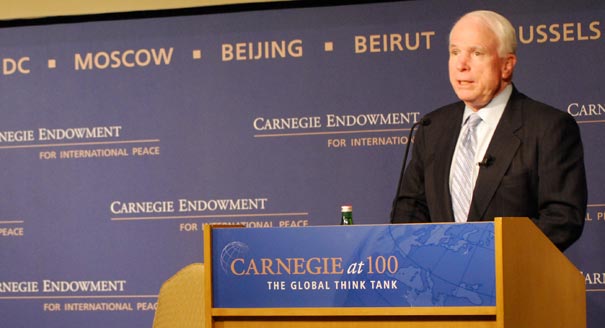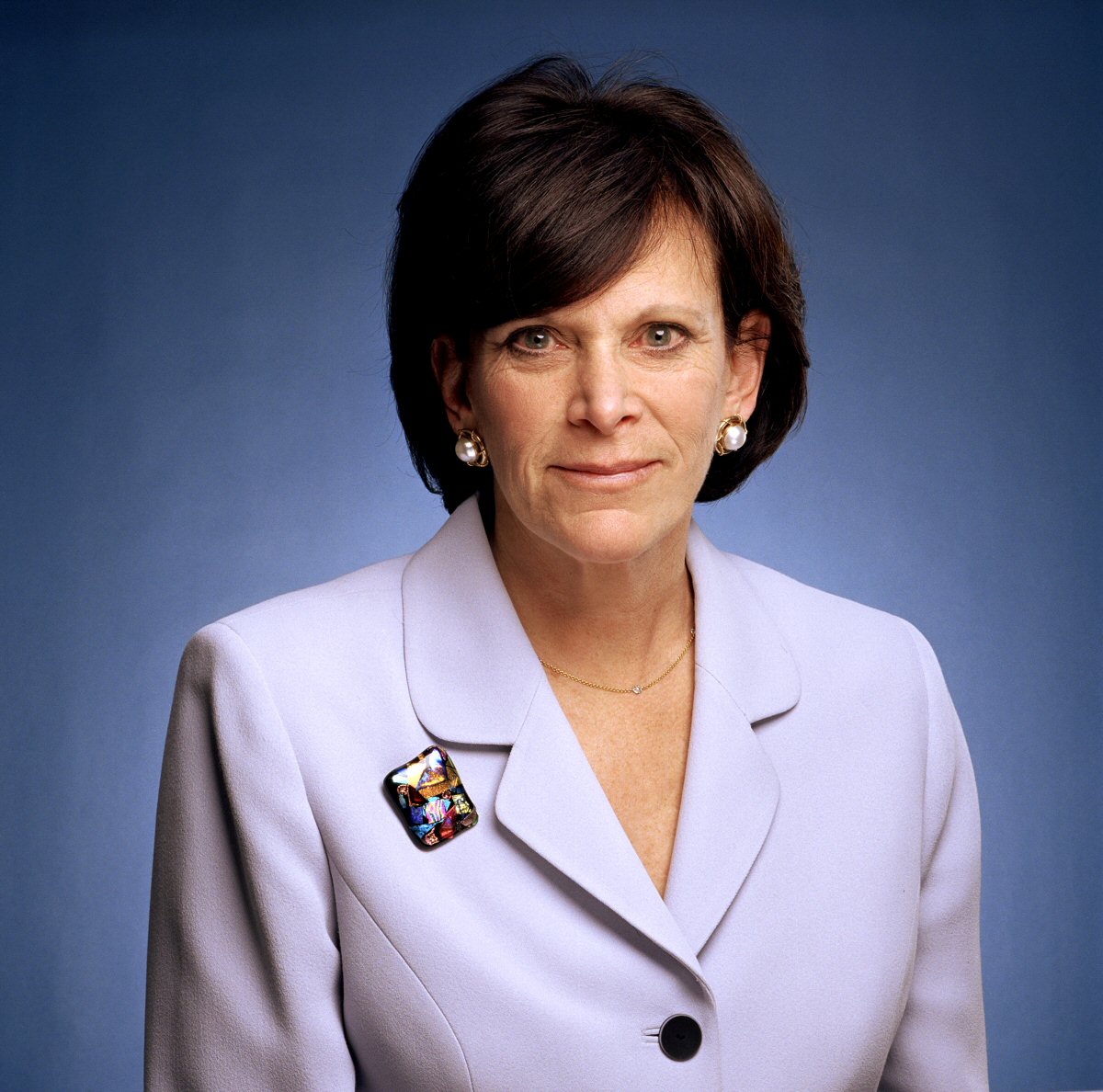{
"authors": [
"John McCain",
"Jessica Tuchman Mathews"
],
"type": "event",
"centerAffiliationAll": "",
"centers": [
"Carnegie Endowment for International Peace"
],
"collections": [],
"englishNewsletterAll": "",
"nonEnglishNewsletterAll": "",
"primaryCenter": "Carnegie Endowment for International Peace",
"programAffiliation": "",
"programs": [
"South Asia"
],
"projects": [],
"regions": [
"North America",
"United States",
"South Asia",
"Afghanistan",
"Pakistan"
],
"topics": [
"Security",
"Military",
"Foreign Policy"
]
}
Senator John McCain on Afghanistan
Wed, April 18th, 2012
Washington, D.C.
Ahead of May’s crucial NATO summit in Chicago, Senator John McCain discussed U.S. policy toward Afghanistan. Carnegie’s Jessica Mathews moderated.
Impending Transition
Mathews noted that the International Security Assistance Force (ISAF) has 130,000 troops on the ground in Afghanistan today, 90,000 of them American. Over the next two years, these numbers are going to decline dramatically. And in late 2014, if current plans hold, then the security transition to Afghan control will be complete, Mathews said.
- Signs of Progress: Mathews noted that there have been some recent signs of progress in the transfer of prisoners to Afghan control and the handover of oversight of night raids to Afghan forces. A strategic partnership between Washington and Kabul may finally be within reach, Mathews noted.
- Remaining Challenges: Enormous challenges still remain, Mathews added. The Afghan government is still weak and riddled with systemic corruption. Insurgents continue to find sanctuary across the border in Pakistan. And Kabul will remain heavily dependent on outside assistance for the foreseeable future, including even for the core state function of paying for its own security forces.
- Critical Questions: Mathews stated that many critical questions remain about the transition. What will NATO’s role be? What sort of Afghanistan will the coalition leave behind? What are the consequences of various outcomes for American and allied security? And what role should the United States play after 2014?
Afghanistan and the National Interest
- Enduring Significance: The United States is approaching the end-game of what has already been a long war, McCain said, and it is not surprising that the American people are tired of this burden. But he asserted that, despite the fatigue, Americans need to remember that vital U.S. national security interests are at stake in Afghanistan.
- The War is America’s To Lose: Moreover, McCain argued, the war is not lost–there is still a realistic path to success if the right decisions are made in the months ahead, which, he added, gives added importance to the upcoming NATO summit. The United States should view this meeting as a strategic opportunity to recast its entire involvement in Afghanistan, to recommit itself and the alliance not merely to leaving Afghanistan, but to succeeding there.
- Significant Progress: Significant military progress has been made in Afghanistan, including the overhaul of the training of the Afghan national security forces, which was under-resourced and disorganized four years ago, McCain said. There are literally hundreds of thousands of patriotic Afghans who are faithfully in this fight with U.S. troops and increasingly taking the lead, McCain said. That should give Washington hope that the common goal of an Afghanistan able to secure itself, govern itself, and sustain its own progress, is within reach.
Strategically Debilitating Decisions
McCain claimed that while these tactical gains are undeniable, unfortunately U.S. efforts continue to be undermined at the strategic level by the perception that America is planning to abandon Afghanistan once again. The Obama administration has exacerbated this perception through its fixation on leaving Afghanistan and by a series of counterproductive decisions they have taken to accelerate that withdrawal, McCain said.
- Ignoring the Commanders on the Ground: McCain noted that in December 2010, the president provided his military commanders with a smaller surge of forces than they recommended and announced a date certain to begin withdrawing troops the following year. The president then overruled his commanders again in July 2011, choosing to withdraw the full surge earlier than the military commanders recommended. In addition, the administration is now planning to cut the end strength of the Afghan national security forces from 352,000 to 230,000.
- Misguided Focus on Reconciliation: McCain stated that the administration continues to pursue a reconciliation plan with the Taliban that rests on the flawed assumption that real reconciliation is possible right now. But reconciliation with the Taliban will not happen because the United States wants to stop fighting; it will happen when American forces have broken their will to keep fighting. This is a stubborn fact, McCain concluded.
McCain noted that the effect of these and other decisions has been strategically debilitating, since they send a signal to everyone in Afghanistan and the region, both friend and enemy alike, that the United States has lost the will for the fight.
Chicago: An Opportunity to Move Forward
McCain concluded by listing several ways that the United States can seize the important opportunity offered by the Chicago summit:
- To sustain the coalition’s fragile progress in Afghanistan, it is critical that the president resist the short-sighted calls for additional troop reductions which would guarantee failure, he said.
- The administration should clarify that while the end strength of the Afghan security forces may eventually be reduced, that decision will be based on conditions on the ground.
- The upcoming summit is an excellent opportunity to make a strategic breakthrough by finalizing a strategic partnership agreement with Afghanistan, McCain concluded. He noted that with the recent agreements to transfer detention operations and night raids from U.S. to Afghan authorities over time, the path is now clear to conclude a strategic partnership. If successful, the strategic partnership agreement could change the narrative in Afghanistan and the region from one of looming international abandonment to enduring international commitment, he said.
Carnegie does not take institutional positions on public policy issues; the views represented herein are those of the author(s) and do not necessarily reflect the views of Carnegie, its staff, or its trustees.
